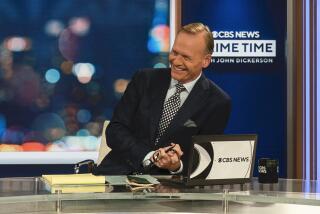Tisch, Paley Given Regular CBS Posts
NEW YORK — Laurence A. Tisch was made president and chief executive and founder William S. Paley was named chairman of CBS on Wednesday, in appointments that the broadcaster’s directors hope will usher in a new era of tranquility after two troubled years.
The board said it voted unanimously to choose the two men. Tisch and Paley had been named to their posts on an acting basis last September, during a tumultuous board session that toppled former Chairman and Chief Executive Thomas H. Wyman.
“We went over a number of names for the job, but things had begun to go so good that we decided this was the best way,” said Paley, 85, who founded the broadcast network 60 years ago.
Paley and Tisch, 63, the Loews Corp. chairman who is also CBS’s largest shareholder, have in the last four months sold assets and continued a wrenching reorganization of the company, which has struggled with slower advertising growth, takeover attempts and falling ratings.
They have sold off the company’s book- and music-publishing units, accelerated job-cutting in the broadcast unit, and eliminated a layer of executive management. More than 1,500 positions, or about 10% of the work force, have been cut by layoffs and attrition over the last 12 months.
Even some who have not been entirely pleased with the reorganization saw a favorable side to the appointments. “It would have been really chaotic around here if they had brought in somebody new who had to satisfy the founder and principal shareholder,” one executive said. “That would have been an impossible task.”
Tisch, who was said to be unavailable for comment, insisted in a statement that he had originally not intended to remain in the post. But some Tisch acquaintances said they expected from the first that he would take it.
“The way he talked about the job, it was clear he would take it if he could get free from Loews,” one source said. Tisch and other members of his family hold a stake of nearly 25% in Loews, a hotel, tobacco and movie-theater concern with annual revenues of more than $17 billion.
With a stake of nearly 25% in CBS, Tisch would have remained a major power at the company even if he had not taken the chief executive’s position, observers noted.
Paley said the CBS board had been been impressed with Tisch’s grasp of the broadcast business. He acknowledged in an interview that he and Tisch have had “differences of opinion,” but get along well with each other and with other senior managers of the company.
He declined to speculate on how long he will remain chairman, but said he plans to stay closely involved in programming decisions. Since taking the job last Sept. 11, Paley has spent many days at the company’s California entertainment operations and is consulted on major programming decisions, he said.
While CBS officials have recently said that the streamlining of the organization has largely been completed, Paley declined to rule out further changes.
Observers said major changes may come, for example, at CBS’s Records Division. While the division has recently been highly profitable, it is perceived as less efficient than some competing record companies. Walter Yetnikoff, the division president, has made no secret that he has clashed with Tisch and would like to purchase the unit in a leveraged buyout, sources noted.
A management consultant that has recommended budget reductions and staff cuts at other divisions is now reviewing operations at the Records Division, and some cuts are expected.
The appointments drew approving comments from executives of some of the network’s affiliated stations, who were convened for a meeting at St. Thomas, in the U.S. Virgin Islands. “This should calm the waters, and that’s what the company needs at this point,” said Phil Jones, of KCTV in Kansas City, who is chairman of the CBS affiliate board. “It’ll bring continuity.”
Dan Rather, the network’s anchorman, said the appointments also pleased the News Division. “Things have settled down around here, and the presence (of Tisch and Paley) has been a big part of the reason,” Rather said.
He said the executives’ commitment to news was evident recently when Howard Stringer, president of the CBS News Division, was able to get a half hour’s air time set aside for a special on the Iran- contra scandal. “It didn’t take more than a five-minute phone call,” Rather said. Tisch and Paley “both know about news and care about news.”
Wall Street also has given generally favorable ratings to the reign of Tisch and Paley, although analysts note that much remains to be done. Sales for the three networks are generally expected to rise just 2% to 3% this year, over 1986.
Only this month, one analyst, Richard McDonald of First Boston Corp., forecast that the CBS television network may lose as much as $25 million this year.
Paley said he was confident the network would remain profitable in 1987. He forecast a major upturn in the network’s financing and ratings performance in the fall, when the new programming lineup reaches the air.
“You’ll see the fruits of our efforts then,” he said.
CBS’s income from continuing operations was up 3% for the first nine months of 1986, rising to $152 million from $147 million. For the same period, the CBS Broadcast Group’s profits were down 18%, largely because of the weak demand for national advertising.
More to Read
The biggest entertainment stories
Get our big stories about Hollywood, film, television, music, arts, culture and more right in your inbox as soon as they publish.
You may occasionally receive promotional content from the Los Angeles Times.











